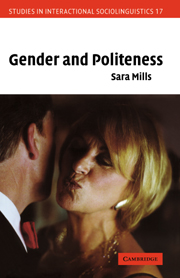5 - Gender and politeness
Published online by Cambridge University Press: 13 November 2009
Summary
Introduction
Given the model of gender described in the last chapter, and given the model of linguistic politeness as described in chapters 2 and 3, it is difficult, if not impossible, simply to approach the relation between gender and politeness as a question of an investigation of the production, by individual men or women of a number of linguistic features which are assumed to be unequivocally polite or impolite. What I should like to do instead is to consider the complexity of the relationship between gender and politeness, so that the common-sense nature of gender and politeness and their relation to each other is troubled. Here, I aim to analyse the way that certain practices which are considered to be polite or impolite are, within particular communities of practice, stereotypically gendered. As I discussed in chapter 4, these stereotypes do not actually exist as such, but are hypothesised by particular speakers and hearers within communities of practices, on the basis of their representation by others, and are then negotiated with. It is this connection between gendering of practices and assessments of politeness and impoliteness which is of interest. These stereotypes of behaviour which are considered to be appropriate within particular contexts feed back into individual participants' assessments of what is appropriate in terms of their own behaviour.
First, in this chapter, I analyse stereotypes of gender and politeness, and then move on to a discussion of the theoretical work on gender and politeness which I argue seems to replicate stereotypical views of women's politeness, rather than describing women's or men's actual linguistic performance or interpretative frameworks.
- Type
- Chapter
- Information
- Gender and Politeness , pp. 202 - 237Publisher: Cambridge University PressPrint publication year: 2003



